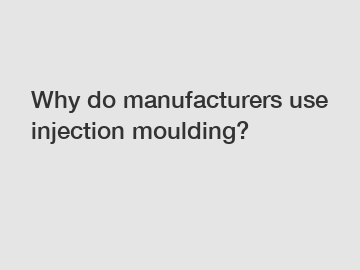Feb. 02, 2024
Hardware
In the vast world of manufacturing, various production techniques have emerged over the years, each offering its unique set of advantages. However, one technique that has gained immense popularity across industries is injection moulding. With the ability to produce highly detailed and intricate components at a rapid speed, manufacturers have found this process to be not only efficient but also cost-effective. In this blog, we will delve into the reasons why manufacturers continue to rely on injection moulding as their preferred method of production.
Precision and Complexity:
One of the primary reasons manufacturers opt for injection moulding is its exceptional precision and ability to create complex designs. This manufacturing process allows for the production of intricate parts with high levels of accuracy, including complex geometries, thin walls, and intricate details. By using computer-aided design (CAD) software and advanced moulding techniques, manufacturers can achieve the tight tolerances required to meet the demanding specifications of various industries.

Speed and Efficiency:
Another significant advantage of injection moulding is its ability to produce large volumes of products quickly and efficiently. The process involves injecting molten material into a mould cavity at high pressure, allowing for a rapid production cycle. Additionally, the use of automated machinery and robotics in injection moulding ensures consistent production rates, minimizing the risk of errors and delays. This speed and efficiency directly translate into reduced production costs and increased profitability for manufacturers.
Material Versatility:
Injection moulding offers manufacturers a wide range of material options, enabling them to select the most suitable materials for their specific application. From commonly used plastics like polystyrene and polypropylene to more specialized materials such as thermoplastic elastomers and composites, the versatility of injection moulding allows manufacturers to adapt to diverse product requirements. Furthermore, manufacturers can incorporate additives and reinforcements into the materials, enhancing the product's strength, durability, and overall functionality.
Cost-Effectiveness:
When it comes to manufacturing, cost is always a crucial consideration. Injection moulding excels in providing a cost-effective solution for mass production. Initially, the tooling costs associated with creating the mould may be high; however, once the mould is made, it becomes significantly cheaper to produce each unit. The high efficiency and minimal material wastage in injection moulding contribute to cost reduction, as manufacturers can produce more parts using less material and energy compared to other manufacturing techniques.
Consistency and Quality:
In an increasingly competitive market, maintaining consistent quality is crucial for manufacturers to build a reputable brand. Injection moulding provides manufacturers with the ability to reproduce parts with exceptional consistency, ensuring that each product meets the exact specifications required. By controlling factors such as temperature, pressure, and cooling time, manufacturers can reduce variations between parts, making injection moulding highly reliable and ideal for industries where consistency and quality are paramount.
Environmental Considerations:
In recent years, sustainability and environmental consciousness have gained significant importance in the manufacturing industry. Injection moulding aligns with these emerging values. Excess material from the manufacturing process can often be recycled and reused, reducing waste and minimizing the environmental impact. Additionally, advances in material research have led to the development of biodegradable and eco-friendly plastics, allowing manufacturers to produce environmentally conscious products using injection moulding.
Conclusion:
Injection moulding has undoubtedly established itself as a go-to manufacturing technique for various reasons. Its precision, speed, efficiency, material versatility, cost-effectiveness, consistency, and environmental considerations make it an attractive choice for manufacturers across industries. As technology continues to evolve, the injection moulding process is likely to adapt and further enhance its capabilities. With its numerous advantages, injection moulding remains a vital pillar of modern manufacturing, enabling the creation of high-quality, complex components at an unmatched speed and efficiency.
Are you interested in learning more about injection mold slide design, rapid tooling suppliers, oem low volume plastic moulding? Contact us today to secure an expert consultation!
If you are interested in sending in a Guest Blogger Submission,welcome to write for us!
All Comments ( 0 )